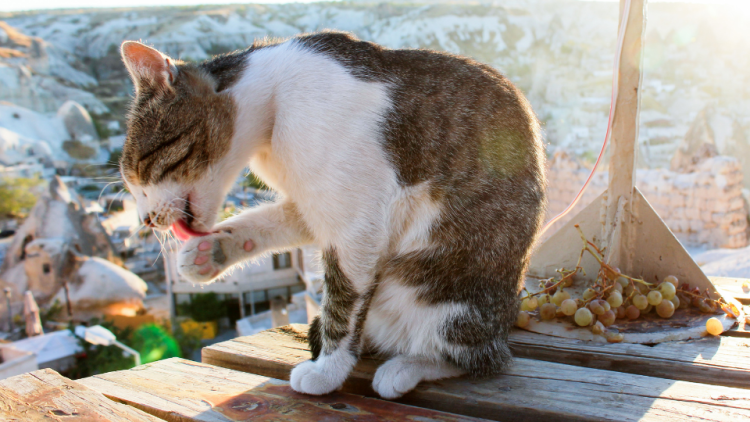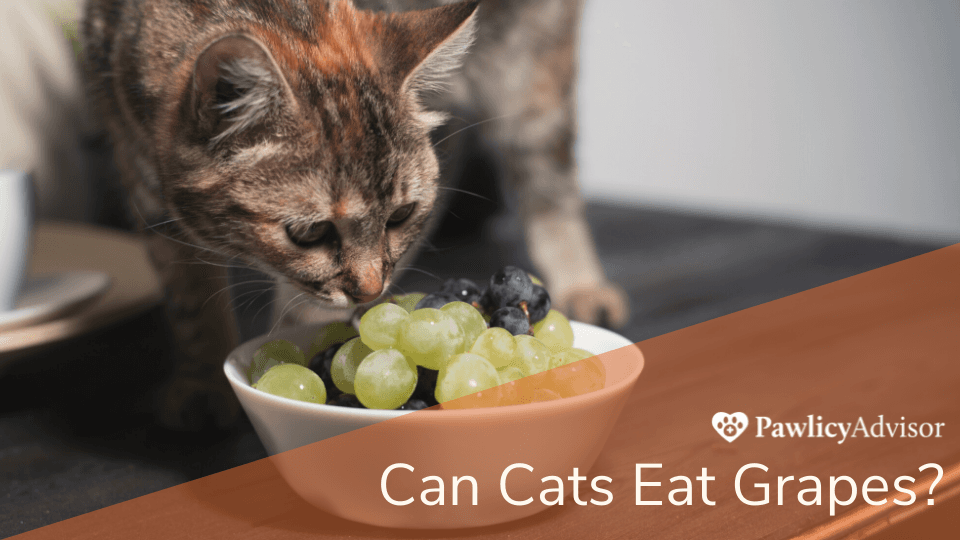You might have heard that grapes aren’t the best snack choice for dogs, but are grapes safe for cats? The answer is less straightforward. One or two grapes probably won’t do any harm, but a large amount can be toxic to felines, which poses a serious risk. Grapes are high on the dangerous list of food for pets and can cause food poisoning worse than chocolate in cats!
Keep reading for answers to common veterinary questions about grape toxicity in pets.
Table of Contents:
- Can cats eat grapes?
- Why are grapes bad for cats?
- Can cats eat raisins?
- Symptoms of grape poisoning in pets
- Treating toxicosis in cats
- What to do if your cat eats grapes
- Key Takeaways
Pro Tip: Is your cat prone to eating things they shouldn’t? Many cat owners rely on pet health insurance to reimburse up to 100% of their vet bills, allowing them to focus on their loved ones rather than financial stress.
Can cats eat grapes?
We don’t recommend it, but technically, cats can eat grapes but only in very, very small quantities. Most cats don’t care for fruits, including grapes, but some might enjoy the texture and have a couple of grapes from time to time as a healthy snack.
That said, cats don’t need grapes in their diet, so why take the risk of feeding them? As obligate carnivores, felines’ dietary requirements are met exclusively through animal meat. Commercial cat food companies pack all those proteins and minerals into bite-sized kibble to accommodate the now-domesticated house cats who once roamed the wild.
There is no need to add extra food to their meals, but if you’d still like to, always choose foods known to be safe for cats and stay away from grapes.
Why are grapes bad for pets?
If consumed in large amounts, grapes can cause acute kidney injury that may develop into renal failure. As a result, the kidneys start to shut down, urine production stops, and toxins begin to accumulate. It’s unclear why grapes are toxic for pets. However, experts theorize that the poisonous effect is due to the animal’s inability to metabolize certain compounds in the fruit, such as tannins.
Grapes can cause sudden kidney failure and other gastrointestinal (GI) issues in dogs. Although there’s no concrete scientific evidence proving the fruit has the same effect on cats, there are reports of similar reactions in felines. Some believe these are less common because cats are pickier when it comes to their food and usually don’t indulge in grapes.
Keep in mind, other human foods toxic to cats that can make them very ill include:
- Chocolate
- Milk and dairy
- Garlic
- Onions
- Citrus

Can cats eat raisins?
Just like grapes, raisins can be toxic to cats. If your cat eats more than two to three raisins, they may start to show symptoms of toxicosis, such as:
- Vomiting
- Diarrhea
- Dehydration
- Anorexia
- Lethargy
- Weakness
If food poisoning in cats is left untreated for more than 24 hours, the risk of severe health consequences increases significantly. By that point, the animal is likely to develop renal failure.
Acute renal failure is a serious diagnosis, but the condition is reversible if your pet promptly receives treatment. If you suspect your cat got into some raisins, immediately take them to the vet at first sight of unordinary behavior.
Symptoms of food poisoning in pets
Grape toxicology does not affect all cats and dogs, but when poisoning (toxicosis) does occur, it can be life-threatening.
Cats with grape toxicosis experience diarrhea and/or vomiting, usually within six to 12 hours of ingestion. Other symptoms can include:
- Loss of appetite
- Lethargy
- Rapid breathing
- Weakness
- Increased thirst
- Dehydration
- Abdominal pain
- Tremors
Kidney failure usually develops within three days. If the kidneys stop producing urine, then the pet’s chances of survival will be very low.
How to treat food poisoning in cats
A veterinarian will induce vomiting to remove the toxin from the cat’s body. Then, they might administer activated charcoal to attract any remaining toxic particles, carry them through the GI tract and out of the body.
Some cats may require hospitalization so they can receive IV fluids to boost the production of urine and protect the kidneys. A vet team will check blood work and monitor the kidneys for up to 72 hours after ingestion. If there are no signs of kidney damage after two or three days, most cats recover entirely.
Pro Tip: Are you financially prepared if your cat were to eat something toxic? Pet insurance can reimburse you for a portion of the vet bill and offers valuable peace of mind should your feline friend need medical treatment unexpectedly.
What to do if your cat eats grapes
If you find a cat nibbling on a single grape that’s accidentally fallen on the kitchen floor, they’ll probably be fine.
However, if your cat eats a large number of grapes, be sure to call your vet or the ASPCA Animal Poison Control Center (888-426-4435) right away.
Key Takeaways
- Cats can eat grapes only in minimal amounts. Ingestion of large quantities of grapes and raisins can cause an upset stomach or even cause poisoning in cats.
- Symptoms of grape toxicity include loss of appetite, lethargy, increased thirst, dehydration, and abdominal pain. In severe cases, grape toxicity can result in acute kidney failure and even death.
- If you notice any of these symptoms after your cat has eaten grapes, call your vet immediately.
- Although a grape or two probably won’t harm your cat, it’s best to stay on the safe side and avoid feeding it to your pet altogether. There are many other safe and nutritional foods your kitty can indulge in.
